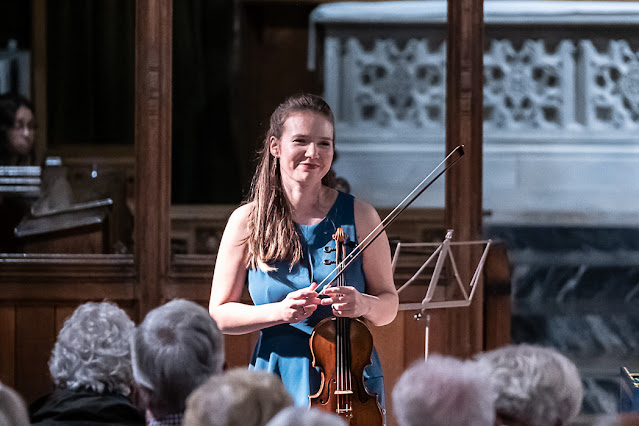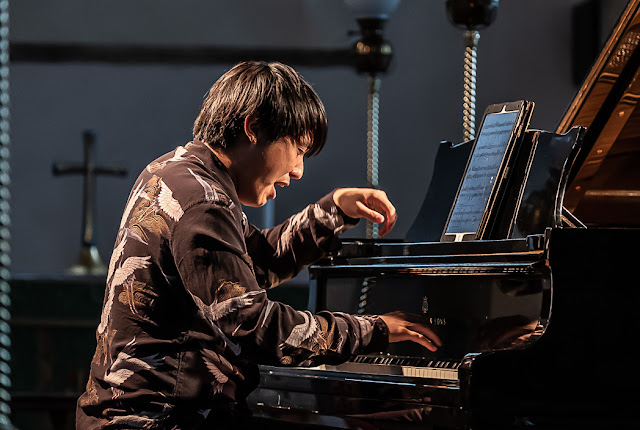 |
| Tamsin Waley-Cohen performing at the Two Moors Festival in 2022 |
Founded in 2001, the Two Moors Festival takes place each October in venues across Dartmoor and Exmoor. This year’s festival runs from 3 to 13 October 2024 under the artistic direction of violinist Tamsin Waley-Cohen, who took over the festival in 2020. For this year’s theme, Tamsin has chosen the daily 24 hour cycle of various lights and darknesses, wakefulness and slumber that we all experience.
She explains, “I’ve chosen to explore this year’s theme from different perspectives, from the 24 hours of the day and the 24 keys of western music, to magic and dreamscapes, the bright sunlight of the baroque to the reflected moonlight of romanticism, and our connection to the Earth’s daily turn on its axis. This promises to be a Festival full of evocative experiences and storytelling from both internationally established and exciting up-and-coming artists.”
The festival brings together locations in two National Parks, an area where a lot of people live but which is one of the most sparsely populated places in the UK. The festival was created by John and Penny Adie in 2001, in response to the devastation caused by foot and mouth disease. And then, of course, Tamsin took over in 2020, shortly before the COVID pandemic hit.
Tamsin describes the aims of the festival as to perform chamber music and song with top international artists in beautifully intimate venues in a special natural setting, thus bringing high quality music making to the doorstep of the people living in the National Parks. The festival also attracts visitors, people come for a weekend away from business, combining nature with music. Tamsin describes the audience as a mix of people, they have a dedicated core of local followers, many of whom travel to the various concerts, whilst the festival also encourages and welcomes visitors.
 |
| George Xiaoyuan Fu performing at the Two Moors Festival in 2021 |
One of the big changes that Tamsin introduced to the festival was to focus the programming on the two centres, with one weekend on Exmoor (3-6 October 2024) and one weekend on Dartmoor (10-13 October 2024). The festival takes place at a spectacular time of year, thus they are able to encourage visitors to walk as well. Some come for the whole festival, other for a few concerts.
One of Tamsin’s intentions when programming is to offer a great variety of high-quality events, suiting different kinds of musical tastes. She also tries to have combinations of artists or particular programmes which are unique to the festival. These, and the venues, lend the festival its particular flavour, and she hopes that it mixes uniqueness with some playfulness. She wants the events to be particular moments in time that people can come to be part of, that only happen at the festival. Rather poetically she adds that that is the beauty of live music, you cannot hold it in your hands.
Like all performing artists, Tamsin has always created her own programmes and enjoys putting ideas together. She likes adding elements of surprise and placing pieces in different contexts, so that people can turn the kaleidoscope of their imagination. Prior to joining the Two Moors Festival, she programmed a music series at the Tricycle Theatre (now Kiln Theatre), as well as a music festival at the Bargello in Florence. Programming is something that she indeed thinks about, and it has grown out of her own practice.
Another of Tamsin’s innovations at the festival is that it is programmed around a theme. So this year’s theme of 24 hours can reference the circadian rhythms, but also the 24 keys of music, the music of the spheres and the turning of the worlds. On Exmoor and Dartmoor, which have recognised dark skies, you can feel the time of day more intensely, and the festival also will be using the theme to incorporate folklore and magic.
It is these folklore and magic elements that are prominent in the opening concert, being given by baritone Roderick Williams and pianist Christopher Glynn when they perform RVW’s Songs of Travel, plus songs by Rebecca Clarke, Ireland, Ina Boyle, Joan Trimble, Charles Wood and Gurney, along with the premiere of Freya Waley-Cohen’s The Moon, the Moss & the Mushrooms [Freya is Tamsin’s sister, and I chatted to her in April, see my interview]. Freya’s new set of four songs uses poetry by Coleridge and Dorothy Wordsworth. The title highlights folklore references in the poetry, but there is also the fact that both poets used to walk in the evening, a time of day when colours are changing, when we go from active to reflective.
When I ask Tamsin about the rest of the festival, she laughs and comments that everything is a highlight, but she brings out some of the festival’s subthemes. Notable visitors to this year’s festival include harpsichordist Mahan Esfahani, who is doing two concerts, the well-loved Carducci String quartet, Connaught Brass whom Tamsin heard performing in Aldeburgh, and Stile Antico, an ensemble that Tamsin calls extraordinary, saying she loves the luminescence of their sound. There is a concert from James Pearson and Lizze Ball, thus extending the range to jazz.
The recorder quartet Palisander, a group Tamsin calls highly imaginative, are giving a magic-themed concert which will involve them moving around the stage and combining poetry and music. This is followed by Tamsin’s own concert, Angels and Demons, exploring angelic and demonic music for solo violin, the two concerts forming a nice subtheme for Friday 11 October. On Saturday 5 October, there is an afternoon and evening when the music moves from the direct brightness of the Baroque, through the Enlightenment to the more elusive chiaroscuro of the Romantic. In the afternoon, Tamsin and Mahan Esfahani join forces for a programme of Handel, Bach, Benda and CPE Bach, then in the evening the Carducci Quartet move from Haydn to Mozart to Schubert’s Death and the Maiden.
Pianist George Xiaoyuan Fu returns to the festival after his critically acclaimed recital in 2021, when he performed Messiaen and the event was one of the Arts Desk’s concerts of the year. This year he is performing a programme of Chopin and Ravel. The festival’s final concert is the pairing of violinist Henning Kraggerud and pianist Clare Hammond in Equinox, a work that is a collaboration between Kraggerud and author, Jostein Gaarder. Tamsin has found it exciting to bring Kraggerud to the festival as he is a practical musician and a composer, and she feels that this is something that we have lost in modern practice, but Kraggerud brings them together.
The festival is expanding its family events, and is presenting two family concerts which will involve musicians from this year’s competition, and Tamsin loves the way the young people rise to the occasion. The festival has a young musicians competition every year [further details]. Open to those aged 18 under, living or going to school in the South West and Grade 7. The standard is high, and this year’s winners are aged 9, 14 and 15.
In fact. Tamsin won the competition herself when she was aged 14! Her father’s family farms on Exmoor with the farm looking out over the moor. Growing up, Tamsin spend a lot of time here and it is an area she loves, she has a strong connection and affection for Exmoor. She tries to play two concerts each year, one in each place. This year she is giving her Angels and Demons solo recital and her concert with Mahan Esfahani.
Full details from the Two Moors Festival website.
The blog is free, but I’d be delighted if you were to show your appreciation by buying me a coffee.
Elsewhere on this blog
- A superb sense of community: Mascagni’s Cavalleria Rusticana at Blackheath Halls Opera – opera review
- Remembrance and renewal: Peter Seabourne’s My Song in October – record review
- Both audience & player go on a journey together: Latvian pianist Reinis Zariņš discusses Messiaen’s Vingt Regards which he performs at the London Piano Festival – interview
- Celebrating Jommelli in style: Ian Page & The Mozartists make a compelling case for this neglected music – concert review
- Fire and water in the library: Siren Duo in an imaginative flute and harp recital for Temple Music – concert review
- An interview with the Snow Maiden: I chat to Ffion Edwards about taking on the title role in Rimsky Korsakov’s opera with English Touring Opera – interview
- A journey of remarkable emotional depth: Laurence Kilsby and Ella O’Neill at Wigmore Hall – concert review
- Engaging charm: Bampton Classical Opera in a delightful version of Alcina that does not take itself too seriously – opera review
- The Game: director Leo Doulton on blending opera with interactive storytelling and video game at this year’s Tête à Tête – interview
- Web of influences: Harry Christophers & The Sixteen’s Choral Pilgrimmage at Old Royal Naval College Chapel, Greenwich – concert review
- Home




%20(c)%20Russell%20Duncan.jpeg?w=670&resize=670,446&ssl=1)
.png?w=670&resize=670,446&ssl=1)




